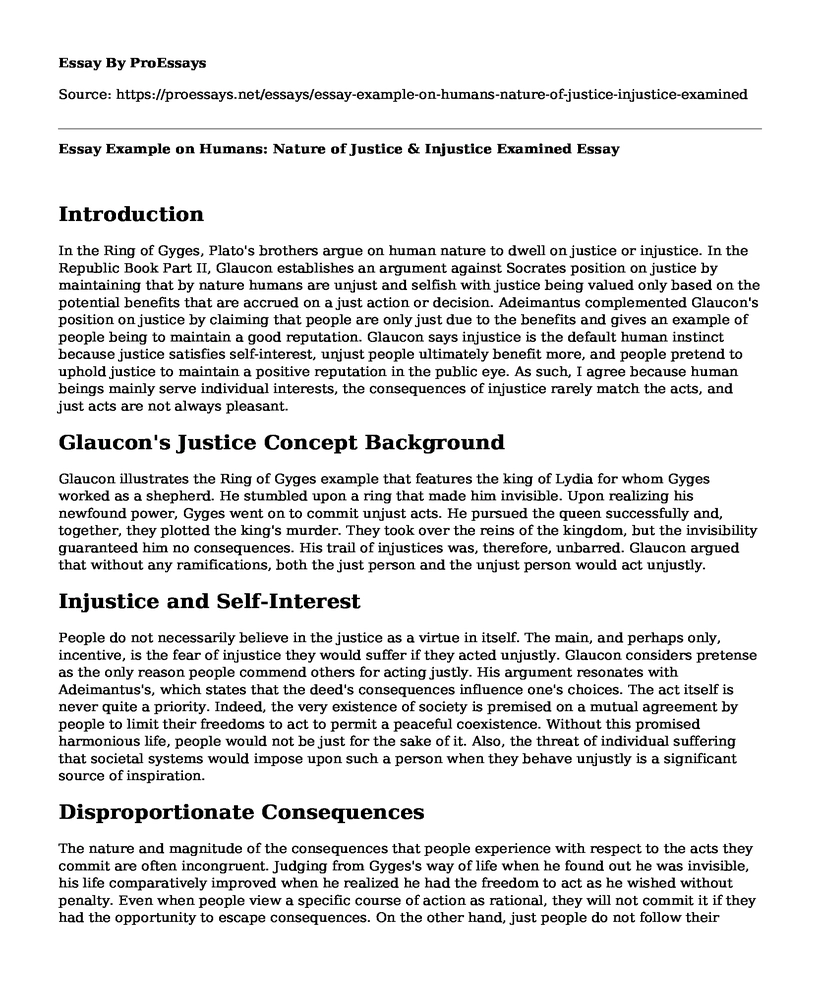Introduction
In the Ring of Gyges, Plato's brothers argue on human nature to dwell on justice or injustice. In the Republic Book Part II, Glaucon establishes an argument against Socrates position on justice by maintaining that by nature humans are unjust and selfish with justice being valued only based on the potential benefits that are accrued on a just action or decision. Adeimantus complemented Glaucon's position on justice by claiming that people are only just due to the benefits and gives an example of people being to maintain a good reputation. Glaucon says injustice is the default human instinct because justice satisfies self-interest, unjust people ultimately benefit more, and people pretend to uphold justice to maintain a positive reputation in the public eye. As such, I agree because human beings mainly serve individual interests, the consequences of injustice rarely match the acts, and just acts are not always pleasant.
Glaucon's Justice Concept Background
Glaucon illustrates the Ring of Gyges example that features the king of Lydia for whom Gyges worked as a shepherd. He stumbled upon a ring that made him invisible. Upon realizing his newfound power, Gyges went on to commit unjust acts. He pursued the queen successfully and, together, they plotted the king's murder. They took over the reins of the kingdom, but the invisibility guaranteed him no consequences. His trail of injustices was, therefore, unbarred. Glaucon argued that without any ramifications, both the just person and the unjust person would act unjustly.
Injustice and Self-Interest
People do not necessarily believe in the justice as a virtue in itself. The main, and perhaps only, incentive, is the fear of injustice they would suffer if they acted unjustly. Glaucon considers pretense as the only reason people commend others for acting justly. His argument resonates with Adeimantus's, which states that the deed's consequences influence one's choices. The act itself is never quite a priority. Indeed, the very existence of society is premised on a mutual agreement by people to limit their freedoms to act to permit a peaceful coexistence. Without this promised harmonious life, people would not be just for the sake of it. Also, the threat of individual suffering that societal systems would impose upon such a person when they behave unjustly is a significant source of inspiration.
Disproportionate Consequences
The nature and magnitude of the consequences that people experience with respect to the acts they commit are often incongruent. Judging from Gyges's way of life when he found out he was invisible, his life comparatively improved when he realized he had the freedom to act as he wished without penalty. Even when people view a specific course of action as rational, they will not commit it if they had the opportunity to escape consequences. On the other hand, just people do not follow their deep-seated desires because they are afraid of their fate if they did. As a result, they lead restricted lives they somewhat detest because they want to maintain societal order and have a sense of security. Although this idea impacts social harmony positively, it makes people acting unjustly without adverse effects appear happier than they otherwise would be.
Unpleasant Justice
Acting justly is ultimately uncomfortable because it involves constraining one's desires to promote a peaceful coexistence with other members of society. Like Gyges, one does not have access to the kind of relationships for which they would ideally wish. The wealth of freedom he had when he could finally follow his desires creates the impression that he suffered before he was invisible. Similarly, the life of the just individual appears spiteful because, without the aforementioned negative consequences, they would act vastly different than the facade they put on unjustly.
Glaucon's argument on justice is highly convincing and practical based on human nature in which justice is only self-centered. Glaucon establishes three significant type of goods which are based on intrinsic benefits such as happiness, fear of consequences, and the consequential goods, which are instrumental in influencing people's perception and tendency to uphold justice. Justice is actionable and good based on intrinsic goals and the favorable aspects of such actions. Many people, according to Glaucon, would support justice when it is instrumentally beneficial to one's course. Besides, Glaucon notes that even when injustice is considered good, the law can force people to act against being unjust. As such, no one can willingly act justly, and most people could support injustice so long as one does not suffer negative consequences.
Conclusion
Being just is highly based on the resulting benefits and the consequences of one's unjust actions. Justice, in itself, is not naturally good or bad, but people's actions are determined by the resulting consequences and mostly the potential personal benefits. I agree that the concept of justice per Glaucon that it is self-centered and based on the accruing interests and nature of the consequences. Injustice is a more appealing prospect than justice for three primary reasons those who act unjustly and avoid the consequences appear to lead better lives than those who choose the just path, the implications of injustice do not match the acts, and people principally follow justice to gratify selfish interests. In the absence of the societal bounds of justice systems that keep people in check, they would act unjustly without constraints.
Cite this page
Essay Example on Humans: Nature of Justice & Injustice Examined. (2023, Feb 11). Retrieved from https://proessays.net/essays/essay-example-on-humans-nature-of-justice-injustice-examined
If you are the original author of this essay and no longer wish to have it published on the ProEssays website, please click below to request its removal:
- State of Consciousness Essay Example
- Research Paper on Fraud
- Ethics of Decision Making Paper Example
- Inclusion of College Football as Part of the Areas Covered by Title IX of the Education Amendments Act
- The "Highest Good" - Essay Sample
- Essay Example on Supreme Court Challenges Federal Regulation on Wetlands Isolation
- Essay Example on Probation Officers: Managing Crime and Punishment







